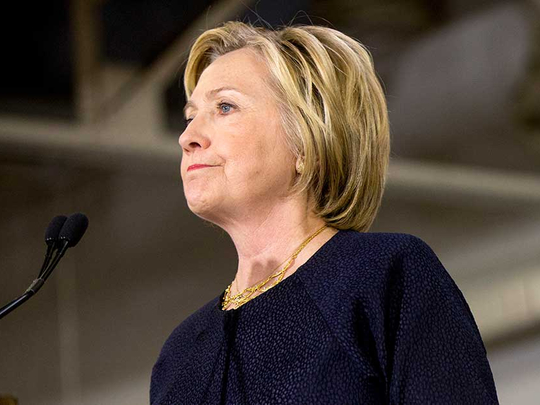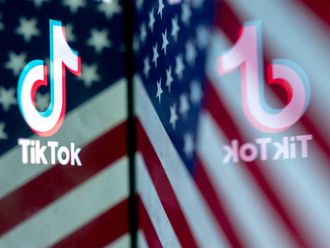
Washington: Hillary Clinton on Saturday cast blame for her surprise election loss on the announcement by the FBI director, James B. Comey, days before the election that he had revived the inquiry into her use of a private email server.
In her most extensive remarks since she conceded the race to Donald Trump early Wednesday, Clinton told donors on a 30-minute conference call that Comey’s decision to send a letter to Congress about the inquiry 11 days before Election Day had thrust the controversy back into the news and had prevented her from ending the campaign with an optimistic closing argument.
“There are lots of reasons why an election like this is not successful,” Clinton said, according to a donor who relayed the remarks. But, she added, “our analysis is that Comey’s letter raising doubts that were groundless, baseless, proven to be, stopped our momentum.”
Clinton said a second letter from Comey, clearing her once again, which came two days before Election Day, had been even more damaging. In that letter, Comey said an examination of a new trove of emails, which had been found on the computer of Anthony D. Weiner, the estranged husband of one of her top aides, had not caused him to change his earlier conclusion that Clinton should face no charges over her handling of classified information.
Her campaign said the seemingly positive outcome had only hurt it with voters who did not trust Clinton and were receptive to Trump’s claims of a “rigged system”. In particular, white suburban women who had been on the fence were reminded of the email imbroglio and broke decidedly in Trump’s favour, aides said.
After leading in polls in many battleground states, Clinton told the donors on Saturday, “we dropped, and we had to keep really pushing to regain our advantage, which going into last weekend we had”.
“We were once again up in all but two of the battleground states, and we were up considerably in some that we ended up losing,” Clinton said. “And we were feeling like we had to put it back together.”
Kerry’s defeat
Presidential candidates have a long history of blaming forces outside their control for their losses. In 2004, John Kerry linked his defeat to a videotape of Osama Bin Laden that appeared days before the election, stoking fears about terrorism. In 2012, Mitt Romney told donors he had lost because President Barack Obama had vowed to bestow “gifts” on Democratic special interests groups, namely African-Americans, Hispanics and young people.
Clinton’s contention appears to be more rooted in reality - and hard data. An internal campaign memo with polling data said that “there is no question that a week from Election Day, Secretary Clinton was poised for a historic win,” but that, in the end, “late-breaking developments in the race proved one hurdle too many for us to overcome.”
Clinton lost narrowly in several battleground states, and by the time all ballots are counted, she appears poised to win the popular vote by more than 2 million votes.
Still, Clinton’s instinct to shun any personal responsibility angered some Democrats. Several donors on the call, while deeply bitter about Comey’s actions, said they believed that Clinton and her campaign had suffered avoidable missteps that handed the election to an unacceptable opponent.
They pointed to the campaign’s lack of a compelling message for white working-class voters and to decisions years ago by Clinton to use a private email address at the State Department and to accept millions of dollars for speeches to Wall Street.
“There is a special place in hell for Clinton staff, allegedly including Cheryl Mills, that okayed the email server setup,” Jim Manley, a Democratic strategist and former senior aide to Sen. Harry Reid of Nevada, wrote on Sidewire, a social media site, referring to a longtime aide and lawyer to Clinton.
Erroneous data
Clinton’s campaign was so confident in her victory that her aides popped open Champagne on the campaign plane early Tuesday. But that conviction, aides would later learn, was based largely on erroneous data showing that young, black and Latino voters and suburban women who had been turned off by Trump’s comments but viewed Clinton unfavourably would turn out for her in higher numbers than they ultimately did.
Exit polls conducted by Edison Research found that among people who said they had decided in the final week before Election Day, 47 percent voted for Trump and 42 percent for Clinton.
As early as Wednesday morning, aides began to explain to Democrats shaken by the loss that the campaign’s sophisticated data modelling had not taken into account the bombshell FBI announcement.
Comey’s letters to Congress went against the FBI’s long-standing tradition of avoiding decisions that could affect elections, but he told aides that he felt he had no choice because he had already weighed in on the case so publicly. In July, he had taken the unusual step of publicly announcing that the FBI would not charge Clinton.
At the time, she believed she had finally put the issue to rest. And after the final debate on October 19 in Las Vegas, she emerged in such a strong position that she began to focus on campaigning for down-ballot Democrats and planned a campaign stop in traditionally Republican Arizona.
“We felt so good about where we were,” Clinton told donors. Before Comey’s first letter to Congress, she added, “we just had a real wind at our back.”












